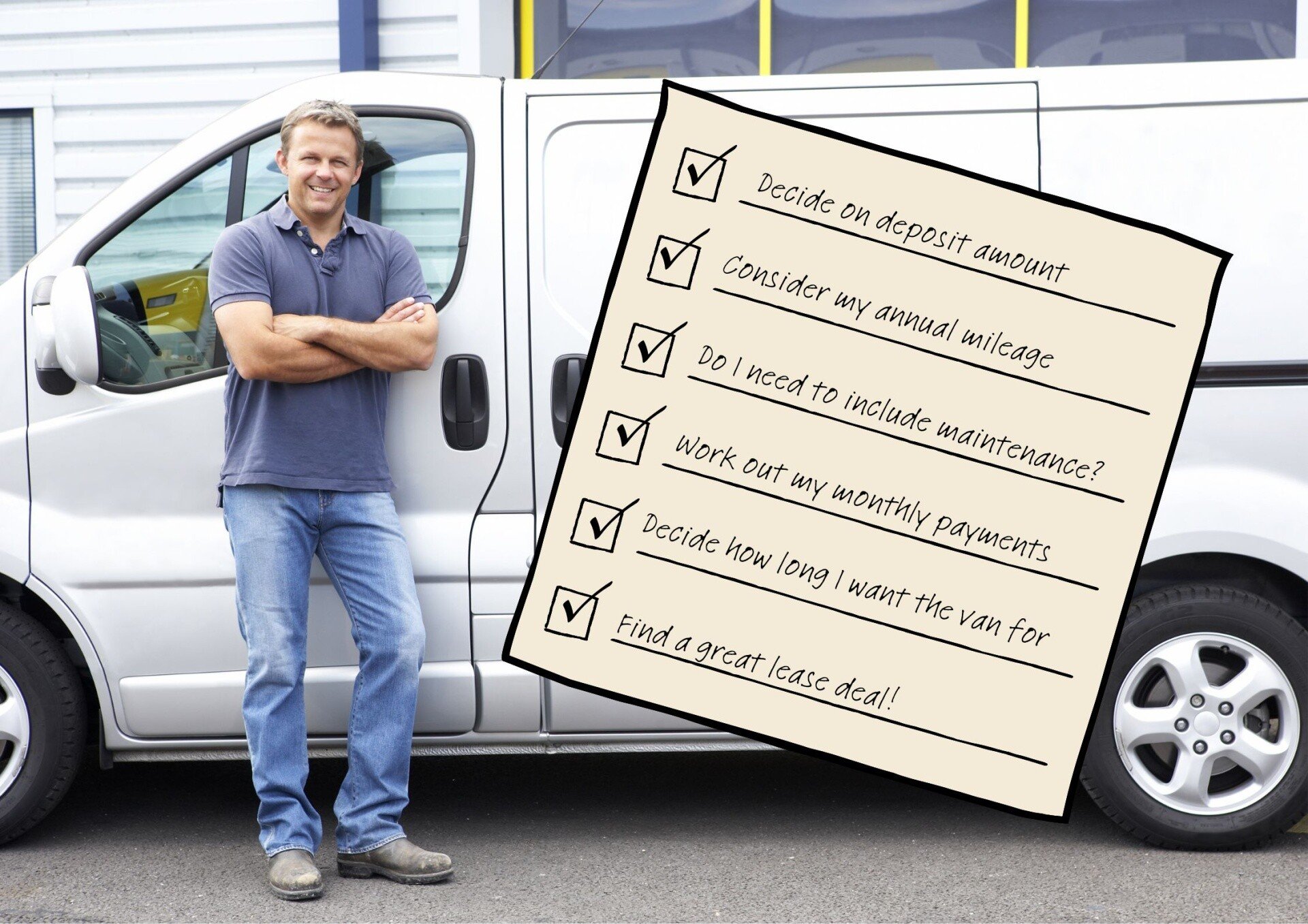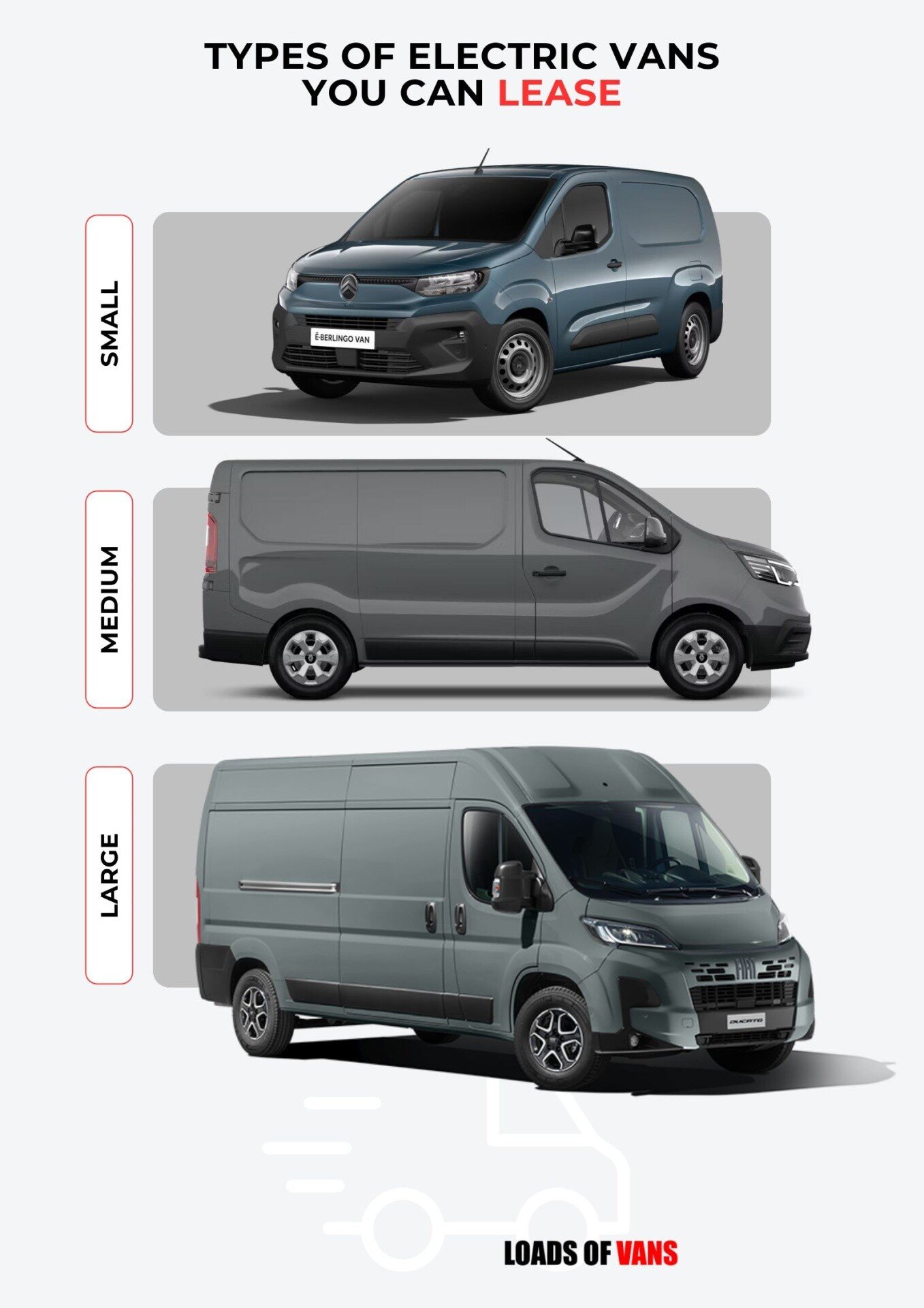Electric Van Leasing - an Eco-Friendly Choice
The Ultimate Guide to Leasing an Electric Van for Your Business
Let's be honest - switching from your trusted diesel vehicle to an electric van is a big decision. You might be wondering about range, payload, charging points, and most importantly, costs.
That's exactly why we've created this comprehensive guide - "Electric Van Leasing Explained". Our aim here is to put your mind at rest and help you understand more about making the switch to electric, without an all-out commitment that comes with purchasing.
Not only does an electric van lease prove an eco-friendly choice, but it is a great way to familiarise yourself with an EV and all its benefits:
Imagine yourself coasting through the city streets with no engine noise, no diesel fumes, and without the worry of paying those dreaded emission zone charges you always forget about!
With fuel prices continuing to climb and more cities introducing clean air zones to keep commercial vehicles away, you need to ask yourself: "Is now the time to go electric?"
Key Takeaways:
- Electric van leasing provides a cost-effective way to switch to a zero-emission vehicle without the large upfront costs.
- The monthly payments are often offset by significant savings on fuel costs and regular maintenance.
- A wide range of electric vans are available to lease - from small car-derived city vans to large panel cargo vans.
- Government grants and tax incentives are available for electric commercial vehicles.
- Increasing zero-emission zones and environmental regulations make electric vans an increasingly practical choice.
- Flexible leasing terms typically range from 24 to 60 months.
- Full maintenance packages can be included in lease agreements if desired.
- Electric vans can offer a lower total cost of ownership compared to traditional diesel vans.
- An expanding charging infrastructure makes electric vans much more accessible for business use.
How Do Electric Van Leases Work?
Like with leasing a standard petrol or diesel van, electric van leasing works in much the same way. In a nutshell, you pay a fixed monthly fee to use the vehicle for an agreed period of time.

Typically, an electric van lease deal works in the following way:
- Put down an initial deposit (usually 3 to 6 months' rental fee)
- Agree on the annual mileage allowance
- Decide on an optional maintenance package
- Make fixed monthly payments for the duration of the contract
- Return the vehicle at the end of the lease term
A lease agreement enables you to drive the latest electric van without freeing up the money to pay for it outright. Most leases run for 2 to 5 years, meaning that when your lease is up, you can upgrade to a newer model.
Types of Electric Vans Available to Lease
Of course, the appealability of leasing an electric van is only as good as the options available to you. If you’re in the market for an EV, then you’ll be pleased to know there are options to suit every type of business:

Small Electric Vans
Small electric vans are a popular choice for many city-based businesses. Due to their compact size, small electric vans operate very much like cars - which is why they are also referred to as car-derived vans.
But, these petite powerhouses are not to be underestimated! With a small-sized electric van, you can navigate busy city streets with ease and tackle even the tightest of parking spots.
5 Advantages of Small Electric Vans:
- Expect lower operating costs compared to larger-sized vans
- Offers a more car-like driving experience
- Easier to park and access restricted spaces
- Benefit from higher range efficiency due to its lighter weight
- Usually has lower initial lease costs
Who Should Consider a Small Electric Van?
- Couriers and parcel delivery services
- Mobile technicians and service engineers
- Florists and small retail deliveries
- Catering companies
- Property maintenance teams
- Healthcare services
- Small trades and craftspeople
Popular Models of Small-Sized Electric Vans
Renault Kangoo E-Tech:
The Renault Kangoo E-Tech stands out from the crowd as a very versatile small electric van with an impressive driving range of up to 186 miles on a single charge.
With a practical payload capacity of 800kg and a generous load volume of 3.9m³, it's perfectly suited for last-mile deliveries and city-based services. The Kangoo E-Tech can reach 80% charge in just 42 minutes when using a rapid charger - this makes it a highly practical van for businesses needing quick turnaround times.
Its side sliding doors provide excellent accessibility, while the comprehensive smartphone integration helps keep drivers connected when on the go. When driven in eco-mode, the driving range can be maximised to its fullest so you can stretch those last few miles that bit further during the working day.
Citroen e-Berlingo:
Bringing impressive versatility to the small van segment, the Citroen e-Berlingo boasts a range of up to 171 miles and a payload capacity of 800kg.
However, its standout feature is the flexible load volume, which ranges from 3.8m³ to 4.4m³ depending on the chosen length variant. The van's rapid charging capability is particularly impressive, reaching 80% charge in just 30 minutes.
Available in two lengths, the e-Berlingo features a modular cabin design that makes it incredibly adaptable for different business needs.
Medium Electric Vans
Without a doubt, the most sought-after type of van, medium-sized electric vans provides the sweet spot for many businesses. They strike a balance between payload capacity, driving range, and manoeuvrability, all in one tidy package.
Mid-size electric vans are becoming increasingly popular as they can handle even the most demanding jobs. Best of all, they can provide significant cost savings over their diesel equivalents.
5 Advantages of Medium Electric Vans:
- A versatile payload and volume capacity
- Available in multiple length options
- Comfortable cabin environments for long workdays
- Good balance of range and load capacity
- Wide variety of configuration options
Who Should Consider a Medium Electric Van?
- Construction and building trades
- Wholesale delivery services
- Mobile workshops
- Equipment rental companies
- Event management services
- Removal companies handling small moves
- Installation teams
- Multi-drop delivery services
Popular Models of Mid-Sized Electric Vans
Renault Trafic E-Tech
A name known and loved throughout the UK, the electric Renault Trafic E-Tech (offer here) demonstrates a significant step forward in medium electric van capability, offering a notable driving range of up to 186 miles from its 52kWh battery.
With a generous payload capacity of up to 1,100kg and a practical load volume ranging from 5.8m³ to 8.9m³ across its various body lengths, it provides excellent versatility for different business needs.
In addition, the van's impressive towing capacity of up to 750kg adds another layer of practicality to this very popular and competitively priced model.
Peugeot e-Expert
Praised for its versatile design, the Peugeot e-Expert is available in three lengths meaning it can accommodate loads from 5.3m³ to 6.6m³. You can expect a maximum payload of 1,226kg and a driving range of up to 211 miles on a single charge.
Advanced driver assistance systems come as standard, making the van particularly well-suited to multi-drop deliveries and service industries. The e-Expert's combination of range, payload, and advanced features means it is an excellent all-rounder for any type of business.
Large Electric Vans
If you’re looking for a capable vehicle to handle serious logistic operations, then a large-sized electric van is the answer.
Large vans offer the best payload capacities and load volumes and are becoming ever more practical where driving range is concerned - meaning that longer journeys are less of an inconvenience.
5 Advantages of Large Electric Vans:
- Expect maximum payload and cargo volume specifications
- Available in multiple body length and height options
- Advanced fleet management capabilities
- Fitted with powerful charging systems
- Various customisation and modularity options
Who Should Consider a Large Electric Van?
- Logistics companies
- Furniture delivery services
- Construction companies
- National delivery fleets
- Removal companies
- Wholesale distribution
- Manufacturing supply chains
- Large retail delivery operations
Popular Models of Large-Sized Electric Vans
Fiat E-Ducato
Standing out in the large van category with its exceptional driving range of up to 230 miles, the Fiat E-Ducato has a class-leading payload capacity of up to 1,885kg. The van offers remarkable versatility with load volumes ranging from 10m³ to 17m³.
Rapid charging capabilities of up to 80% battery in 50 minutes ensure the van is fully operational throughout the busy working day. Multiple battery options and various body configurations make it extremely adaptable - an ideal van for large logistics operations and removal companies.
Renault Master E-Tech
The new Renault Master E-Tech proudly boasts the latest advancements in large electric van technology, featuring a significantly improved 87kWh battery that delivers an impressive range of up to 285 miles on a single charge.
Expect a payload capacity of up to 1,625kg and load volumes ranging from 10.8m³ to 14.8m³ across various body configurations, including panel van, chassis cab, and platform cab variants designed to tick the box for every job.
10 Benefits of Leasing an Electric Van
We’re pretty sure that by this point in the article, you’re getting a good picture of how an electric van can become an asset to your daily business operations.
However, if you need more reassurance, below we’ve listed our top 10 benefits of leasing an electric van in today’s market:
- Lower upfront costs compared to purchasing
- Predictable monthly payments for easier budgeting
- Potential tax benefits and government incentives
- Reduced fuel and maintenance costs
- Zero tailpipe emissions
- Compliance with low-emission zones
- Equipped with the latest technology and safety features
- Quieter operation
- Access to restricted city areas
- Positive brand image
What to Consider Before Contract Hiring or Leasing an Electric Van
No matter what the benefits are of leasing an electric van, you of course need to know that switching from diesel to electric is the right choice for you and your business.
To help in your decision, we’ve highlighted the key considerations before entering into a lease agreement:

Daily Range Requirements
Firstly, calculate your typical daily mileage before working out what that is across the course of a week, month, and even an entire year.
Remember to account for the impact payload has on the total available driving range per full charge, and you’ll also need to factor in seasonal variations in battery performance.
Charging Infrastructure
Consider where and how you will charge the vehicle’s battery at various times of the day and night. If the van is to double up as a vehicle for personal use, you’ll need to ensure you can charge it at work and at home.
Also consider access to public charging networks in your local area, as well as the practicalities of installing charging points at your business premises.
Business Usage
The daily demands of your van are equally as important as the distance it can travel or the ability to fast-charge when on the go.
Identify the amount of cargo space you need as well as the weight you’ll be carrying. This brings us to the types of journeys you do on a daily basis, be it city driving, rural trips or motorway excursions.
Electric Van Contract Hire Leasing Options
So let’s talk more about the leasing options for an electric van, as there are a couple of options you’ll need to consider before going ahead:
- Business Contract Hire (BCH)
- Finance Lease
Below we take a more detailed look at what each of these options offer, so you can determine which is the best one for you…

Business Contract Hire (BCH)
In a nutshell:
- The most popular option for businesses
- An advance upfront payment is required
- Fixed monthly payments throughout the term
- Option to have maintenance packages included
How Does it Work?
Business Contract Hire (also known as BCH) is by far the most straightforward and popular leasing option for electric vans. Think of it as a long-term rental agreement where you have exclusive use of the van for a set period while making fixed monthly payments to cover the costs.
The Business Contract Hire structure is designed to be simple and predictable. You'll typically pay an initial rental (usually the equivalent of 3, 6, or 9 monthly payments), followed by fixed monthly payments over the agreed term.
Whether you need the van for 2 years, 3 years, or more, there are durations to suit every requirement. At the end of the agreement, you simply return the van back to the leasing company.
Financial Benefits:
Did you know that VAT-registered businesses can typically reclaim 100% of the VAT on monthly rentals if the van is used exclusively for business?
Monthly rentals (including electric vans) are allowable business expenses, so leasing a vehicle actually reduces your taxable profits.
Let’s not forget that fixed monthly costs make budgeting easier and more predictable to forecast, and of course, leasing means there is a lower initial financial outlay compared to purchasing.
Contract Terms:
- Typical BCH agreement lengths range from 24 to 60 months
- Annual mileage limits must be agreed at the start
- Maintenance packages can be included in the monthly payment
- Fair wear and tear conditions apply
- Early termination fees may apply if you decide to end the contract early
Finance Lease
In a nutshell:
- Fixed monthly costs with the opportunity for no deposit upfront
- More flexible mileage terms without restrictions
- You don’t need to buy the vehicle at the end of the contract
- Different end-of-contract options
How Does it Work?
A Finance Lease can provide more flexibility than a Business Contract Hire can, making it a particularly attractive option for those who want some of the benefits of ownership without actually owning the vehicle outright.
This option combines some aspects of hiring with some aspects of ownership. While the leasing company legally owns the van or car, your business takes on many of the risks and rewards of ownership. The key difference from BCH is what happens at the end of the agreement.
Financial Structure:
- Initial rental payment (typically 3-12 months)
- Monthly payments over the agreed term
- Option to pay lower monthly payments with a larger final balloon payment
At the end of the agreement, you can sell the van as the leasing company's “agent” and keep most of the sale proceeds. Another option is to continue using the van for a minimal annual fee, or part-exchange the van for a new one and begin another contract.
Choosing Between Business Contract Hire and Finance Lease:
Business Contract Hire (BCH) might be better if you:
- Want simple, fixed monthly payments
- Prefer to change vans every few years
- Don't want to worry about selling a vehicle
- Need predictable costs for budgeting
- Want included maintenance packages
- Prefer simpler accounting
A Finance Lease might be better if you:
- Need flexible mileage terms
- Want to modify the van for specific business needs
- Would like to benefit from the van's resale value
- Require longer terms than BCH offers
- Want more control over maintenance
- Plan to keep the van for an extended period
Cost of Leasing an Electric Van
So let’s get to the nitty gritty - the actual cost of leasing an electric van!
As you can imagine, the monthly leasing costs will vary depending on factors such as vehicle model and specification, length of lease term, annual mileage allowance, initial deposit amount, and if you want to include maintenance services as part of the package.
Typical monthly payments range from £300-£600 for small vans and £400-£800 for larger models. While this may seem higher than conventional van leasing, consider the savings you could make, including:
- Up to 60% lower fuel costs
- Reduced maintenance expenses
- Tax benefits and grants
- Congestion charge exemptions
Conclusion: Is it Worth Leasing an Electric Van?
More than ever before, electric van leases are becoming an increasingly attractive option for businesses looking to modernise their fleet while maintaining financial flexibility.
With lower running costs, environmental benefits, and expanding infrastructure, embracing the switch to an electric van makes both commercial and environmental sense. All that’s left to decide now is if you feel ready to make the switch!
Frequently Asked Questions:
Q: Are electric vans 100% tax deductible?
A: Yes, electric vans qualify for 100% first-year capital allowances, meaning businesses like yours can deduct the full cost from pre-tax profits. In addition, there are lower benefit-in-kind tax rates for electric vans used privately by employees.
Q: What happens if the battery degrades during the lease?
A: The battery’s warranty is typically covered throughout the duration of the lease, protecting you against significant degradation and any associated costs.
Q: Can I install a charging point at my business premises?
A: Yes, government grants are available for workplace charging installation which makes them all the more accessible to businesses of all sizes.
Q: Is insurance cheaper on electric vehicles?
A: Insurance costs for electric vans can be slightly more pricey than petrol or diesel vans due to higher vehicle values and specialised repair requirements. However, this is often offset by lower running costs and maintenance expenses. Many insurers are beginning to offer more competitive rates as electric vans become more common.
Q: What happens if I exceed the mileage allowance?
A: If you travel more miles than what’s been agreed in the lease agreement, then excess mileage charges will apply. To make you aware, these charges are typically calculated per mile over the agreed limit, so can quickly add up!
Q: Can I modify the van for my business needs?
A: Minor modifications are usually permitted with prior permission from the lease company approval, but the van must be returned to its original condition at the end of the contract.
Q: Can you lease an electric van for personal use?
A: Yes, personal lease agreements are available for electric vans, though they may have different terms and tax implications compared to business leases. Personal leases typically require a stronger credit rating and may have higher monthly payments as they can't benefit from reclaiming VAT.
Q: Do electric vans pay road tax?
A: Currently, pure electric vans are exempt from Vehicle Excise Duty (road tax). This represents another significant cost saving compared to conventional diesel vans.
Make the Switch with Loads of Vans
Are you ready to embrace the future of commercial vehicles? Then you’ve come to the right place!
Here at Loads of Vans, we offer competitive financing packages and van leasing deals to suit businesses of all sizes. Our expert team can help you:
- Choose the right electric van for your needs
- Compare different leasing options
- Understand charging requirements
- Calculate potential cost savings
- Arrange test drives
Electric Van Lease Deals
Contact our dedicated electric vehicle specialists today to discuss your requirements and find the perfect electric van lease deals for your business.
Many of our electric vans are available for immediate lease and we offer huge discounts on many new models in stock, including the new Renault Kangoo Electric.
Talk to us today about what we can do for you - we’re open 7 days a week!
Click here to view all our too-good-to-miss van lease deals.


